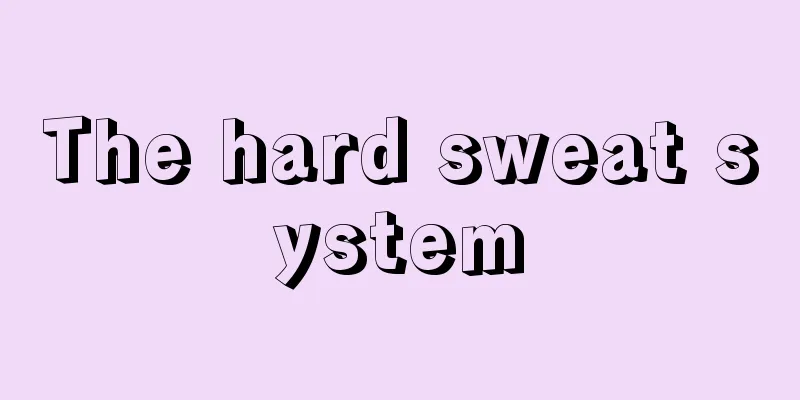The hard sweat system

|
A translation of "sweater system." Broadly speaking, it means a harsh exploitative system dominated by low wages that cannot even maintain a minimum standard of living, but originally, the term was derived from the term "sweater," which refers to contractors who exploited workers in a parasitic manner by taking advantage of excessive competition among workers and the lack of labor unions, forcing them to work extremely low wages, long working hours, and poor working conditions under the contract system. The contract system, which had developed in the past in cottage industries under the wholesale advance system, was used on a large scale and attracted great attention as a hard-working system, becoming the target of social criticism during the transition to monopoly capitalism in the second half of the 19th century. During this period, large companies, which had grown in size, engaged in fierce competition while forcing workers to work harder under new technological innovations. On the other hand, small companies and cottage industries that had been defeated and driven out by large companies that had strengthened their economic dominance flooded into production fields that were not yet under their control, but the large companies organized these small companies and cottage industries into their external businesses in an attempt to strengthen their own competitiveness. As a result, small companies and cottage industry operators began to widely employ unskilled workers, mainly women, and exploit them by using the contract system. Those who criticized the sweatshop system and called for its abolition proposed national legal regulation because it was difficult for unskilled workers to organize, and launched an anti-sweatshop movement. The main purpose of the minimum wage system that was enacted as a result of this movement was to abolish the sweatshop system. [Yoshio Yuasa] [Reference items] | |Source: Shogakukan Encyclopedia Nipponica About Encyclopedia Nipponica Information | Legend |
|
sweating systemの訳語。広くは、最低生活をも維持しえない、低賃金の支配する過酷な搾取制度を意味するが、本来は、請負制度のもとで、労働者間の過当競争や労働組合の欠如などを利用して、極端な低賃金・長時間労働、劣悪な労働条件で労働者を働かせ、中間的で寄生的な搾取を行った請負人を「労働者の汗を搾り出させる人」sweaterとよんだことから生まれたことばである。 古くは問屋制前貸し下の家内工業で発展していた請負制度が、大規模に利用され、苦汗制度として大きな関心をよび、社会的非難の的となったのは、19世紀後半の独占資本主義への移行期である。この時期、規模を大型化した大企業は新しい技術革新の下で、労働者に労働強化を押し付けつつ、激しい競争戦を展開した。他方、経済的支配力を強化した大企業との競争に敗れ、放逐された小企業や家内工業は、まだその支配が及んでいない生産諸分野に殺到したが、大企業はこのような小企業や家内工業をその外部業に編成し、自己の競争力を強化しようとした。このため、小企業や家内工業者は、婦人労働者を中心とする不熟練労働者を広範囲に導入し、請負制度を利用して彼らを酷使するようになった。 苦汗制度を非難し、その廃止を求めた人々は、不熟練労働者の組織化が困難であるがゆえに、国家の法律による規制を提案し、反苦汗制運動を展開した。この運動の結果制定された最低賃金制のおもな目的は、この苦汗制度の廃止にあった。 [湯浅良雄] [参照項目] | |出典 小学館 日本大百科全書(ニッポニカ)日本大百科全書(ニッポニカ)について 情報 | 凡例 |
<<: Head of the body - Head of the body
Recommend
Incoterms - Incoterms (English)
These are rules established by the International ...
Yamashina Institute for Ornithology
This is a research institute run by a foundation l...
Synceros nanus (English spelling) Synceros nanus
…[Yoshinori Imaizumi]. … *Some of the terminology...
Nyikang
… Age-based organizations also play a major role ...
sorcery
...In addition, not only in Japan, but in many so...
Raymond
American architect from what is now the Czech Repu...
Fennel (English spelling) Foeniculum vulgare Mill.
Also known as fennel (illustration). A perennial p...
Itabashi - Bankyo
A small city in northern Taiwan, adjacent to the ...
Piero della Francesca
Around 1420-92 Italian painter. He did not have a ...
Carryover allowance - Carryover allowance
Among the national expenditure budget, there are ...
Special power relationships
A relationship that is established based on a spe...
Procellariidae
...A general term for birds in the Procellariidae...
NAD - NAD
Abbreviation for nicotinamide adenine dinucleotid...
Aktaion (English spelling) Aktaiōn
A hunter who appears in Greek mythology. He was t...
Zubatovism - Zubatovshchina
A policy implemented in early 20th century Russia ...









